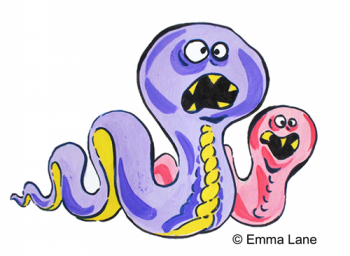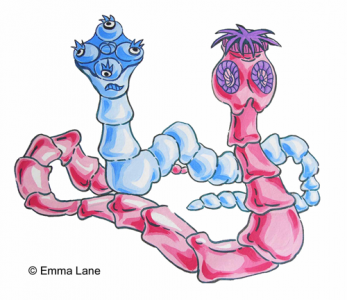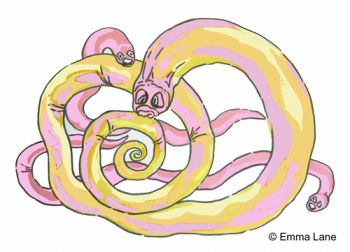Bowel Baddies – How to Spot the Signs
Parasites, fungus and bacteria – could you spot the signs of infection in your clients? These bowel baddies can cause a host of symptoms and health complaints that are easily misdiagnosed or dismissed. Yet infection can result in niggling gastrointestinal problems or mean clients can’t seem to lose weight or gain muscle.
 Fungi overgrowth
Fungi overgrowth
At any one time we may have 5000 different species of fungi living on and in our bodies as normal inhabitants of the skin and gastrointestinal tract.
Fungi can enter our bodies through our mouth, noses, lungs and gastrointestinal tracts. Like most things in life, too much of a good thing can lead to imbalance and start to cause problems.
Signs of a fungi infection or imbalance include:
- Abdominal pain
- Mucus in stool
- Digestive symptoms such as diarrhoea, constipation, bloating and heartburn.
- Nasal itch and congestion
- An inability to concentrate
- Dry mouth
- Bad breath
- Acne
- Nervous irritability
- Craving sugar
- Unnatural irritability
- Allergies
- Food sensitivities
- Headaches
- Mood swings
- Fatigue
- Thrush
- Rectal itching
Symptoms can be worse in damp or mouldy places or after consumption of sugar or yeasts
There are some simple tests that practitioners can carry out to help identify if excess fungi could be the problem, and bringing the body back into balance is the next step. Healing options should take into consideration lifestyle factors, the client’s general health, their job, family and even if they have pets in the home.
 The bug boom
The bug boom
Rates of infectious and parasitic diseases have increased by 30% since 1990.However, parasites are an under reported and often overlooked cause of common health disorders.
The common perception that parasites are only picked up during travel to exotic climes is a fallacy. People living with pets or who regularly eat out could be at risk and because parasites can be contacted via infected soil, even gardening could cause exposure.
Life cycle
During their life, parasitic organisms typically go through several developmental stages that involve changes not only in structure but also in biochemical and antigenic composition. Some of these infections can convert from a well-tolerated or asymptomatic condition to life-threatening disease.
Parasites signs
Like fungi infections, spotting bowel baddies like parasites can often be confused with symptoms of other illnesses and the question of parasites is often overlooked. Common signs of infection include:
- Abdominal pain
- Bloating
- Dysuria
- Central nervous system impairment
- Chest pain
- Chills
- Cramping
- Chronic fatigue
- Colitis
- Coughing
- Diarrhoea
- Digestive disturbance
- Dizziness
- Fever
- Flatulence
- Enlargement of various organs
- Headaches
- Vaginitis
- Jaundice
- Joint Pain
- Weight loss due to malnutrition
- Weakness
- Immuno-deficiency
- Nausea/vomiting
- Swelling of facial features
- Sweating
- Insomnia
- Skin complains
- Ulcers
- Rectal prolapse
- Mental problems
- Lung congestion
- Memory loss
- Night sweats
- Muscle spasms
- Hair loss or thinning
 Hard to diagnose
Hard to diagnose
In some people, intestinal worms do not cause any symptoms, or the symptoms may come and go. Some parasites also cause low red blood cell count (anaemia), and some travel from the lungs to the intestine, or from the intestine to the lungs and other parts of the body.
Many other conditions can result in these symptoms, so laboratory tests are necessary to determine their cause. Plus some parasite infections can be misdiagnosed and it’s likely that the incorrect treatment protocol would then be given. Some examples of this include:
- Trichinella – Can masquerade as many illnesses ranging from flu to generalised or specific aches and pains.
- Filariasis (dog heartworm) on x-ray lesions can be mistaken for lung cancer.
- Ascaris and Lung Fluke could be diagnosed as a peptic ulcer.
- Liver fluke symptoms can be similar to hepatitis.
- Cysticercosis (pork tapeworm) is often misdiagnosed as epilepsy or brain tumour.
- Anisakas simplex shows similar symptoms to acute appendicitis, Crohn’s disease, gastric ulcers and gastrointestinal cancer.
So, accurate parasite testing is key, along with a thorough understanding of the parasite world.
How do we become infected?
It’s a common misconception that parasites can only be picked up on tropical holidays. In fact, there are many aspects of our environment and lifestyle that can influence whether you may become a happy home for some unwanted guests!
Poor lifestyle choices inadequate or excessive nutrition, poor digestion, stress and a challenged immune system can all create an open door for infection. Commercial or poor farming practices, poor personal hygiene, contamination of water, sex, international travel, multiple occupancy living conditions and the poor health of pets all increase the chances of infection.
If your client complains of constant tiredness, is struggling to lose weight or troubled by niggling stomach problems that never go away, parasites or fungi could be the culprit. If you want to learn more about holistic health approaches to helping your clients reach optimal wellbeing why not sign up to our newsletter or like our Facebook page?
Courses
Mission Statement
Our vision is that health practitioners can develop the skills and knowledge to employ a variety of practical methodologies that safely bridge the gap between conventional Western medicine and holistic healthcare practices.
Through our training courses we aim to give practitioners, whatever their approach to health and wellbeing, the knowledge, skills and tools that will enable them to deliver the best possible approaches to resolve their patients or client’s health challenges.
© Integrative Health Education 2014-2024 | Terms & Conditions | Privacy Policy
